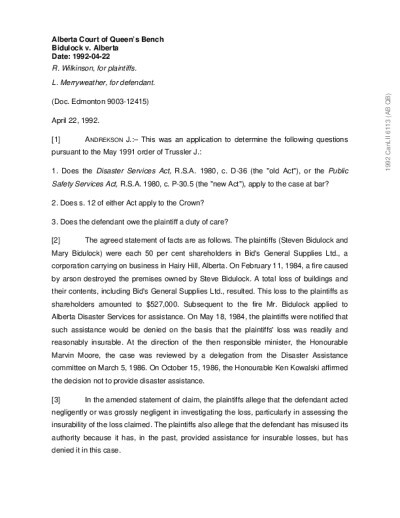
Date
Geographical Area
North America
Countries
Canada
Case Name
Bidulock v Alberta
Case Reference
1992 CanLII 6113 (AB QB) (9003-12415)
Name of Court
Alberta Court of Queen’s Bench
Key Facts
The plaintiffs (Steven and Mary Bidulock) owned 50% of Bid’s General Supplies Ltd., a company based in Hairy Hill, Alberta. Buildings owned by Steve Bidulock were destroyed by an arson fire on 11 February 1984. The buildings and their contents, notably Bid’s General Supplies Ltd., were destroyed completely resulting in damages of CAN$527,000. Alberta Disaster Services refused the plaintiffs’ request for aid on 18 May 1984, claiming that their loss was readily and reasonably insurable. The case was subsequently re-examined and the decision not to give disaster assistance was affirmed by the Honourable Ken Kowalskki on 15 October 1986. The plaintiffs sued the province. As a preliminary matter, the following questions were submitted for determination:
1. Did the Disaster Services Act (1980) or the Public Safety Services Act (1985) apply?;
2. Did the protection from liability under s.12 of either Act apply to the Crown?; and
3. Did the province owe the plaintiffs a duty of care?
1. Did the Disaster Services Act (1980) or the Public Safety Services Act (1985) apply?;
2. Did the protection from liability under s.12 of either Act apply to the Crown?; and
3. Did the province owe the plaintiffs a duty of care?
Decision and Reasoning
The Alberta Court of Queen’s Bench ruled that the trial judge would have to consider whether the act of arson could be construed to entail a “disaster.” If the judge ruled in the affirmative, this would put the plaintiffs within the Disaster Services Act’s jurisdiction. Regarding the second question, the court ruled that whether the protection from liability granted to the Crown by s.12 of either Act applied to the matter at hand would have to be resolved at trial. If the trial judge ruled that it does apply, determining whether the applicable law was the old or new Act would be determined by when the alleged wrongdoing occurred, i.e. in either 1984 or 1986.
Regarding the third question of whether the defendant owed the plaintiffs a duty of care, the court ruled that the plaintiffs have a prima facie duty of care under the ‘Anns test’. This common law duty of care might be restricted if all discretionary judgments are classified as policy decisions; nevertheless, a trial judge will have to rule on that point.
Regarding the third question of whether the defendant owed the plaintiffs a duty of care, the court ruled that the plaintiffs have a prima facie duty of care under the ‘Anns test’. This common law duty of care might be restricted if all discretionary judgments are classified as policy decisions; nevertheless, a trial judge will have to rule on that point.
Outcome
The province had a prima facie duty of care to the plaintiffs, which might be reduced if all of the discretionary decisions were policy decisions, which it was left to the trial judge to determine.
Disclaimer
This case law summary was developed as part of the Disaster Law Database (DISLAW) project and is not an official record of the case.
Document
Document